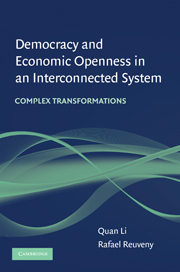5 - Democracy and Conflict
Published online by Cambridge University Press: 05 June 2012
Summary
INTRODUCTION
Interstate military conflict as an extreme form of political exchange is a central feature of the international system and has received the enormous attention it deserves from scholars and policymakers. Currently state sovereignty and anarchy make world peace seem elusive. Chapters 2–4 in Part I modeled the effects of economic openness on democracy, the effects of democracy and economic openness on income inequality, and the reciprocal effects of economic development and democracy, respectively. These analyses ignored the possible impact of democracy and economic openness on interstate political relations. In reality, democracy and economic openness develop in and around nation-states such that they inevitably influence political relations. In fact, scholars have argued and sought to demonstrate that both democracy and economic openness affect interstate military conflict, even though they debate the nature of their effects.
Part II of our book explicitly tackles the relevance of democracy (Chapter 5) and economic openness (Chapter 6) to interstate military conflict. In Chapter 5, we are particularly interested in the relationship between democracy and military conflict. This chapter speaks to two separate bodies of literature: one on democratic peace and the other on the causes of democracy. Both topics have been the subjects of voluminous research, generating two large bodies of literature. Our contribution is not to overthrow but to build on and connect these two separate bodies of literature, highlighting and analyzing the previously overlooked reciprocal causal link between democracy and conflict.
- Type
- Chapter
- Information
- Democracy and Economic Openness in an Interconnected SystemComplex transformations, pp. 125 - 157Publisher: Cambridge University PressPrint publication year: 2009

